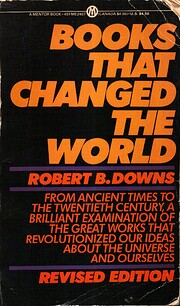

Clica una miniatura per anar a Google Books.
|
S'està carregant… Books That Changed the World (1956 original; edició 1956)de Robert B. Downs
Informació de l'obraBooks that Changed the World de Robert B. Downs (1956)
 No hi ha cap discussió a Converses sobre aquesta obra. Not a book to be reread often and I have let 50 years lapse between readings. Meanwhile, I managed to read five of the sixteen books listed. I confess, it was like penance in most cases, going back to school, not reading for pleasure but to see if I could read, digest and absorb important information. I read this one sort of as a Cliff's Notes for the other books that I knew I would never actually sit down and read. Sense ressenyes | afegeix-hi una ressenya
From the Bible to "Das Kapital," this revised and greatly expanded edition is a monument to the power of the printed word--an informative discussion of many of the most important works ever created. Reissue. No s'han trobat descripcions de biblioteca. |
Debats actualsCapCobertes populars
 Google Books — S'està carregant… Google Books — S'està carregant…GèneresClassificació Decimal de Dewey (DDC)001.3Information Computing and Information Knowledge HumanitiesLCC (Clas. Bibl. Congrés EUA)ValoracióMitjana: (3.87) (3.87)
Ets tu?Fes-te Autor del LibraryThing. |
||||||||||||||||||||||||||||||||||||||||||||||||||||||||||||||||||||||||||||||||||||||||||||||||||||||||||||||||||||||||||||||||||||||||
"The Invention of Science", which is a very thorough and scholarly work, attempts to refute the assumption of just about everybody, including the author of this book, that Copernicus's "De Revolutionibus" was extraordinarily influential. He points out that Copernicus's was just a rearrangement, and that the stars are still fixed in Copernicus's outer shell, not going off in all directions as we know they do today. He shows that many natural philosophers of the subsequent years seemed to take little interest in Copernicus's work and he argues that it was Tycho Brahe, whose concept of the universe was a whole lot more three-dimensional that had the greater influence. He could be correct, but that's a lot of accepted wisdom to overthrow.
There is an interesting, to me, passage in the chapter on "Mein Kampf" which I've included in the Common Knowledge section. Hitler wrote about techniques of propaganda, and one of his central principles was to keep it simple, to give the people just one enemy to hate, and whenever you want to mobilize them against anything, associate that thing with the one true enemy. In his case, this was "the Jews". But if we look at today's propaganda, I think the one true enemy is the only slightly more abstract "white supremacy/racism" and so everything must be connected to that. We note, of course, that the doctrine that only "white" people can be racist helps to make this abstract evil into a concrete race, in this case "whites" instead of Jews. In the quotation I've attached in the Common Knowledge section, Hitler rants against France but manages to achieve, by words and not by logic a connection to the Jews, who are at the bottom of the French evil. One can imagine some 1930's German, unaffected by the propaganda, laughing at the shear incoherence of this man's invective. But we have the same incoherence now, as everything that is disliked by the propaganda machine is turned into "white supremacy" by words and not by logic. That is how Larry Elder becomes "The Black Face of White Superemacy" and so forth. We deride the incoherence of the propaganda, just as our hypothetical reader of "Mein Kampf" derides its incoherence, but maybe that is to utterly miss the point. It seems to be working reasonably well on the masses now and it was quite effective then. (